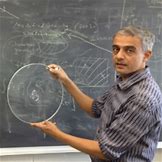
Gravitational lensing is the shearing and magnification of light we receive from distant galaxies. Bhuv uses ‘weak’ lensing, the small distortions in the shapes of millions of galaxies, to map the large-scale distribution of dark matter and address cosmological questions. His other interests span a variety of topics in theory and data analysis, largely enabled by massive cosmological surveys.
Talk Title and Astract:
Galaxy clusters: the halo boundary as a cosmic clock
The dynamical edge of galaxy clusters can be detected using the turnaround of particles and galaxies. This phase space caustic, called splashback, produces a subtle feature in the profiles of mass and light that are well measured in imaging surveys. I will introduce the theory and show measurements from the Dark Energy Survey and CMB surveys. I will show how the measured splashback radius is sensitive to gravity and dark matter interactions. I will also describe how its use as a cosmic clock can probe the quenching and evolution of galaxies in cluster environments.
Would you like to join this Zoom seminar? Please email Donna Hayes.